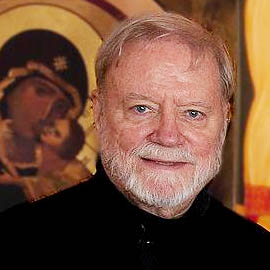The Parables and the Structure of the World
11 September 2016By way of showing the parabolic teaching of Jesus to be a fulfillment of biblical prophecy, the Gospel of St. Matthew (13:35) cites a line from Psalm 77(78):2: “I will open my mouth in parables; I will utter things hidden from the foundation of the world.” The first half of this quotation, found in Matthew alone among the four Gospels, comes verbatim from the traditional Septuagint version of the Psalms, but no extant version of that text explains precisely where Matthew derived his wording in the verse’s second half. It is reasonable to think that he was quoting the psalm from memory, which would explain why he quoted it inexactly. However that may be, two expressions particularly stand out in Matthew’s wording of that verse: “things hidden” and “from the foundation of the world.”
First, “things hidden.” In the original Greek, this expression is a single word, kekrymmena, the neuter plural perfect passive participle of the verb krypto, meaning “to hide.” It is reasonable to think that Matthew’s use of the word here is related to the parable that he places immediately preceding this quotation, namely, the woman who “hid” (enekrypsen) the leaven in three measures of meal (13:33). In short, the parables have to do with things that are cryptic, concealed beneath the surface of other things. These hidden things are what the Lord speaks of in his parables.
Second, “from the foundation of the world” (which I take to be the preferable reading among the manuscripts). That is to say, the “things hidden” have to do with Creation itself. The world is already the secret bearer of inner mysteries. They have been there all along, concealed in the structure of existence, and the Lord addresses our attention to them in his parables. Matthew is asserting that the created world has a parabolic quality that summons the human imagination.
In Matthew, moreover, this assertion falls immediately after two parables that have to do with the mystery of transformation, not only the parable of the woman hiding the leaven in the dough, but also the parable of the mustard seed that grows into a veritable tree (13:31–32). These two parables are not simply accounts of “growth” in a quantitative sense. The tiny seed does not grow into a bigger seed, nor does the leaven simply become a larger bit of yeast. There is in each case, rather, a complete transformation. The mustard seed does not even slightly resemble a mustard bush, nor does a bit of leaven look at all like a loaf of bread. In both instances there is, rather, a mystery of life that is revealed by a process of transformation. The parables point to that inner mystery of transformation at the heart of the world.
Two further facts need remembering with respect to the Lord’s parables. First, the world did not begin in an embryonic state, but in a state of maturity. It is common and customary to pose the question, “Which came first, the chicken or the egg?” as though one were stating a deep and inscrutable problem. It is neither deep, however, nor inscrutable. God created chickens first, not eggs. God made plants first, not seeds (Genesis 1:11–12,20). God made things in their maturity, in the state in which they manifest, not conceal, the mystery of the Kingdom.
Second, the world presented in the Lord’s parables, the world in which lies concealed the mystery of transformation, is not simply the raw state of nature. It is especially the world in its relationship to human economy and labor. The parables pertain not only to the state of nature portrayed in Genesis 1, but also to the conditions of labor in Genesis 2–3.
Thus, the parable is not just about the mustard seed, but about the “mustard seed which a man took and sowed in his field.” It is not just the leaven the Lord speaks of, but the “leaven which a woman took and hid in three measures of meal.” The parables are not concerned simply with things that grow, but with the human planting and harvesting of those things (13:24–30). The parables are not just about fish, but about men catching those fish in a net and processing them (13:47–48). Similarly, the lost sheep and the lost coin are components of human economy (Luke 15:1–10). In short, the parabolic mysteries of the Kingdom, which the Gospels tell us lie hidden in the world since its creation, are related to human labor and human economy.
This article first appeared in the July/August 2003 edition of Touchstone. Reprinted with author’s permission.







